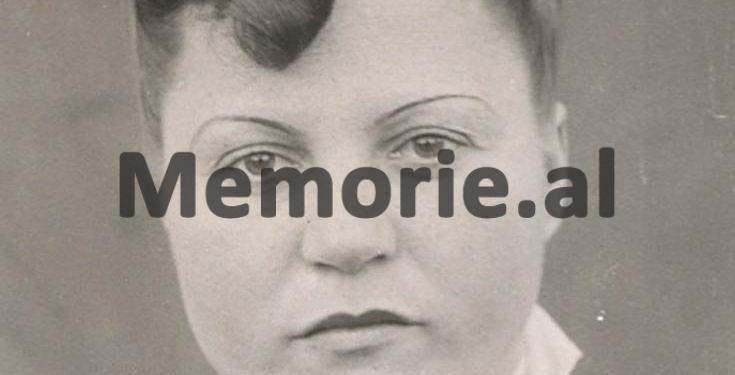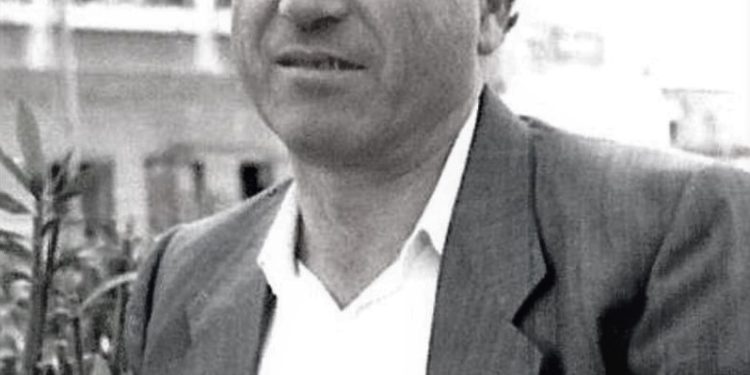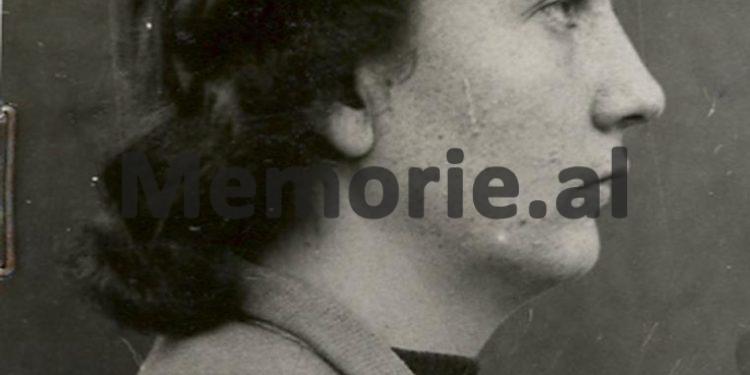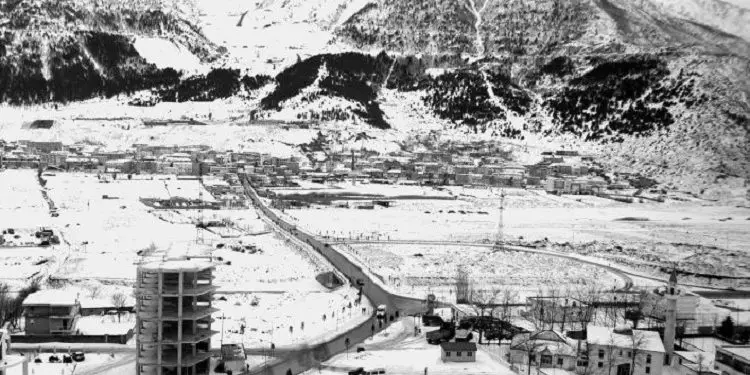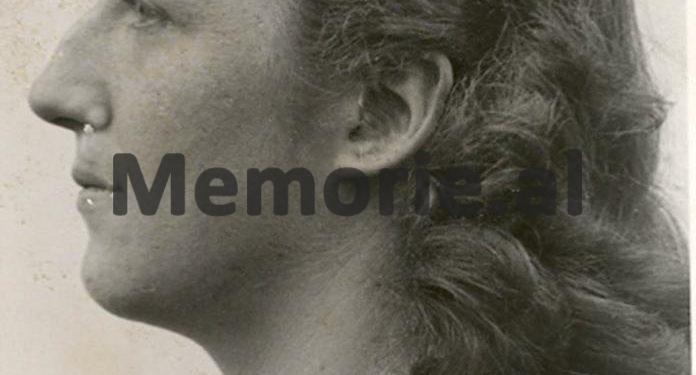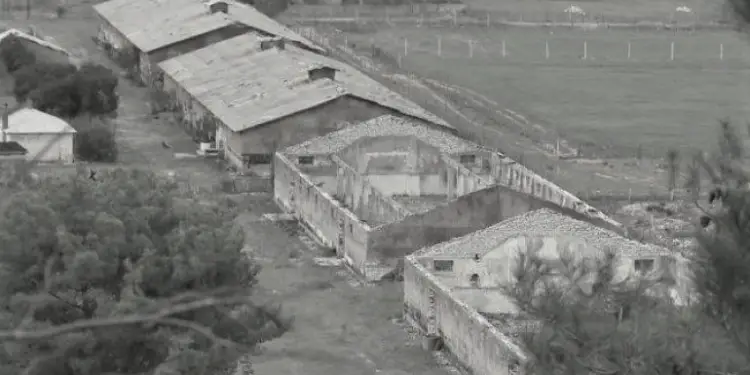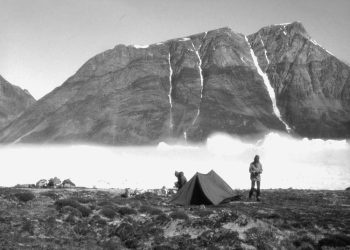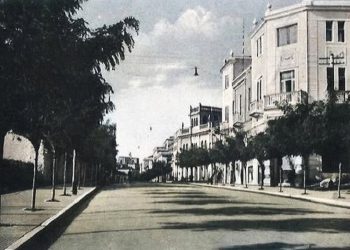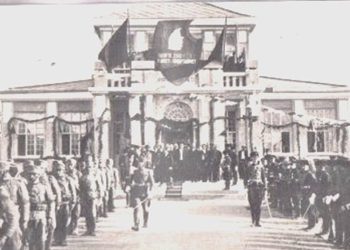Memorie.al / In the 1950s, the internment camp in Tepelena embodied the most characteristic features of an extermination camp, especially for minors and the elderly. Those years of famine throughout Albania were experienced there with difficulties compounded by other factors. The families of political fugitives were carelessly thrown into that hell of barbed wire, where survival was left to chance. The geographical position of the place, where the barracks – mere sheds of old planks – were built, was chosen in service of evil.
During autumn and winter, a bitter wind blew from the nearby river gorge, significantly contributing to the drop in temperature in that mountain-surrounded area. The old planks, full of holes from torn-out nails, which were used to build the two-story collective floor-like beds, fostered bed bugs (“çimkë”) like a high-yield parcel. This voracious parasite never had its fill of sucking the blood of the anemic internees, robbing them of their sleep – the only time they could temporarily forget the misery they endured.
The cold, highly corrosive water further intensified the famine crises. Organically consumed by chronic hunger, the children of the Tepelena camp cried mournfully every evening until exhaustion put them to sleep. To put an end to this sorrowful “chorus,” the police ordered two young internees to disguise themselves with cloth over their heads and scare the children with threatening gestures. However, the consequences of this action were fatal from the first night. Three children, terrified by fear, became severely ill. One of them died. After this drama, the children were left alone to freely express the discomfort of chronic hunger. Meanwhile, the mortality rate among minors reached alarming proportions, even for the cruel regime that senselessly sacrificed them.
By a government decision, children under the age of 12 could be released from internment if a relative in free life vouched for them, in the absence of parents. Due to the class war even within the extended family, not many children were saved from the barbed wire during those years of horror.
The food base for the internees was spoiled bulgur wheat from military warehouses, which the army no longer used because it was full of small flies and worms. They were also given 400 grams of corn bread a day for the elderly and children, and 600 grams for the internees who went to forced labor. The bulgur, boiled in a communal cauldron with salt and no oil, was distributed to the internees twice a day: in the morning and evening. The rush of these extremely hungry unfortunates made it impossible to distribute the bulgur without the participation of the camp’s rude police.
The police shouted, pushed, and beat mercilessly, but order was difficult to maintain. Nothing can stop a being threatened by organic extinction due to a continuously empty stomach in the struggle for survival. The chilling sight of the hungry rushing towards the cauldron of stale, steaming food was the best illustration of Hugo’s observation as an expert on misery: “Over peoples, kings; over kings, war; over war, hunger”!
No one thought of cleaning the miserable aluminum plate with bulgur soup, on which worms and flies floated. No one could resist the temptation to gulp down the banal content of the porous, black aluminum plate, which they clutched in their trembling hands, even when the soup was still hot. Moreover, the use of a spoon was an unnecessary luxury in those circumstances, where each internee had something insufficient to eat only twice in 24 hours. The great sacrifices of this earthly hell were the mothers with children.
Although they worked all day, transporting wood on their backs from the forest across the river, they were forced to save something from their meager ration of 600 grams of promised corn bread (in fact, 600 grams were never given) to give to their children in the evening, when they couldn’t sleep on an empty stomach. Naturally, the great physical suffering of these heroic mothers was compounded by sharp spiritual pain, watching their children snatched from their arms by hunger. One stormy night in January 1953, a brave mother from Kruja managed to escape from the camp with her 14-year-old son.
Blocked by the snow, they were caught the next night by the Pursuit Forces. By order of the Tepelena Branch of Internal Affairs, the camp command decided to give them an exemplary lynching in front of the internees, the mother and the adolescent son. Both had their hands handcuffed behind their backs. Before starting their physical punishment, the police tied the mother’s handcuffs to her son’s with a piece of rope about one meter long.
The truncheon blows were initially not of the usual ferocity. The ominous spectacle had to last before the glaring eyes of the representatives of the Branch of Internal Affairs and the officers of the camp command. Although the blows on the mother did not take long to intensify, she clenched her teeth without uttering a sound. Meanwhile, the boy, traumatized by what was happening in the sight of the internees and the numerous officers and police could not resist for long. With every blow, he groaned and tried to curl up. A blow on the shin caused him great pain, and the boy screamed, “Oh, mother!”
The stoic mother continued to endure the hard truncheons without a sound, which had already torn her shirt in places. To avoid “ripping open” her mouth and pleasing the uniforms of terror, she had bitten her lower lip so hard that blood was dripping from it. But she was a mother, and as such, she could bravely face physical blows, but not the stab of the heart. Hearing her son’s distressed cry, her voice came out as a muffled groan: “My son!” She threw her body over the boy to shield him from further blows.
“Take away the rabid bitch!” ordered the Deputy Head of the Internal Affairs Branch, who was present there. The blows on the mother intensified, while one of the policemen grabbed her firmly by both shoulders to pull her away from her son. However, her teeth had gripped the collar of her son’s jacket with all the strength that a mother’s body releases at the moment of acute spiritual pain, and she would not let go.
“Flay them!” shouted the Deputy Head of the Internal Affairs Branch, disfigured by rage. A hard blow to the head covered the brave mother’s face in blood, as she groaned muffled with her teeth fixed on her son’s collar. The crowd of internees turned their backs on the macabre spectacle and, without orders, headed for the barracks. Only the executioners, prepared for the crime in the party’s ideological “incubators,” remained near the victim.
It was not long before scurvy epidemic gripped the camp. Most of the internees could barely see the road even in the middle of the day, and when the sun went down, someone had to hold their arm while walking. This situation put the camp police in a difficult position, as the actions provided for in the internal regulations could not be carried out with people who were virtually blind. The sick internees failed to line up.
The camp command raised the alarm to the Ministry of Internal Affairs about the impossibility of enforcing the required strict discipline. They took no responsibility for the seriously threatened health of the internees. The loss of an internee’s life cost no more than the sheet of paper on which the circumstances of death were briefly described, naturally manipulated. The health of the “class enemy” represented the strength of evil to them.
The Ministry of Internal Affairs sent two trucks of onions to the camp, which were distributed to the most seriously ill. When the miserable condition of the internees had reached its peak, the Ministry of Internal Affairs sent two German women who had been taken prisoner during the war years to the Tepelena camp. They were named Amri and Erna. The former was a doctor, the latter topography engineer. The camp command housed the two German intellectuals in the old barracks, along with the Albanian families.
Since they were young and physically strong, the police forced them to go to work with the Albanian internees, who cut and transported wood on their backs across the river, an hour’s walk away from the camp. The wood was used to heat the camp command officers and for the kitchen. The two Germans suffered greatly trying to learn to cut wood with an axe and carry it loaded on their backs with a rope. Their soft hands became full of blisters and bled, but they did not complain. Over time, a layer of calluses followed the blisters, and the Germans began to get used to the heavy physical labor.
They knew Italian well and communicated with an Albanian internee named Afërdita, who also spoke Italian. Amri and Erna were shocked by the camp’s miserable condition. Especially the mistreatment of children and the elderly by the police was, in their opinion, cruel. “It is surprising,” said Amri, “that the Albanian authorities condemn the mistreatment inflicted on internees during the war years in German concentration camps, while they themselves treat their own people so mercilessly under conditions of peace.
In German camps, you would never find children like here, nor German internees, only foreigners. I do not want to justify what happened there, but it is truly terrible to treat your own people with this growing wave of hatred. No one has the moral right to complain about the mistreatment of foreigners when they themselves exercise terror over their own people.” When Afërdita mentioned their suffering in the Tepelena camp, Amri replied:
“We expect all kinds of mistreatment from the Albanian communists, as we served in the ranks of the German occupying army. Since they torture innocent Albanian children and elderly without a trace of mercy, what can we expect from them?”
The two Germans suffered greatly learning to transport wood loaded with rope. However, thanks to their strong physique and exemplary will to face difficulties, over time they managed to do their forced labor and, in special cases, even help the Albanian internees. There was no bridge to cross the river.
The internee women took off their shoes both going and coming, while the police urged them to walk as fast as possible across the river. One day, when they arrived at the river bank loaded with wood, the water had started to become murky, as it had rained all morning. Frightened by the murky water, the internees hesitated to enter the river. The police began to push and threaten them, because it was getting dark and they wanted to return to the camp quickly.
Compelled by police violence, they carried out the order, holding hands. A short internee, who was convinced she could not cross the river with the load of wood on her back, begged the police for a concession: “Please allow me to halve the load of wood and cross the river twice. I can’t lift the wood all at once, and the water is rising. Do not force me to drown, if you believe in God.”
“There is no God, no, but even if there was, he would side with us, not you dead ones. Therefore, leave God out of it and enter the water.”
With these words, the policeman pushed the internee hard towards the river. She swayed under the load of wood, her feet gave way, and she fell into the water, groaning. With the wood on top, her body sank. The two Germans, who were only two meters away from her, rushed to help her. They quickly lifted her from the water and unloaded her wood. With the help of her friend, Erna threw the wood tied with rope belonging to the sick Albanian woman onto her own load. This woman had injured her leg and was limping as she tried to cross the river without a load. Amri grabbed her arm and helped her reach the other bank.
Even after crossing the river, Erna refused to give the load of wood to the sick Albanian woman, who was trembling from the cold and the pain in her leg. From that day on, the two Germans, upon approaching the river, quickly unloaded the frail Albanian woman and did not let her enter the water loaded. This noble gesture by the Germans attracted the attention of the police, and every time they approached the river bank, they would taunt them: “The enemies of communism recognize each other by smell and form an alliance among them.”
Amri and Erna expressed their indignation to Afërdita about the ugly behavior of the police: “You are all Albanian mothers. Just remembering this fact should make the police’s hand tremble before raising it upon you. But who gave birth to them, a mother or the ideology that has alienated them? A society that mistreats the mother cripples its future.”
In 1956, Amri and Erna were repatriated. On the eve of their final departure, they met tearfully with the Albanian internees with whom they had worked and suffered together. The two Germans took note of the names of some of the escaped husbands of the Albanian internees, who had no news about the fate of their men. They promised that, through the International Red Cross, they would try to secure correspondence with their escaped relatives. Only three months after Amri and Erna’s repatriation, the first letters from the escaped family members of some of the internees arrived at the Tepelena camp. / Memorie.al




